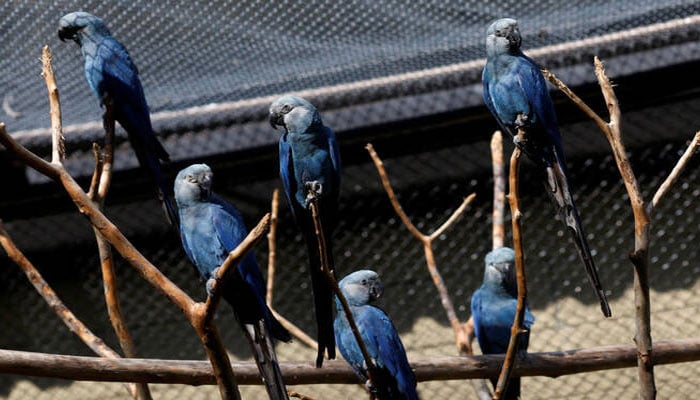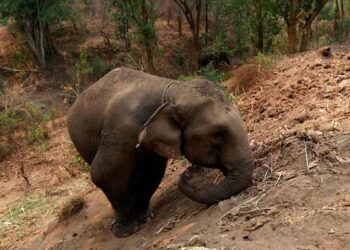Select Language:
This story centers on a bird and a family, but neither is ordinary. The bird in question is the Spix’s macaw, a bright blue parrot known for its complex mating dances. It was officially declared extinct in the wild in 2019. Since then, a captive breeding program has managed to reintroduce some of these birds into their natural habitat in Brazil.
For over two years, authorities across three continents have been investigating why 26 of these birds ended up at a private zoo in India managed by the philanthropic division of a major conglomerate controlled by Asia’s wealthiest family, the Ambanis.
Indian authorities cleared the sanctuary of any illegal activities this week. However, European officials remain vigilant about any potential wildlife exports to Vantara, while Brazil, Germany, and India collaborate toward resolving issues at a United Nations body responsible for monitoring wildlife trade.
Vantara’s 3,500-acre animal rescue and rehab center in Gujarat reports housing about 2,000 species. The site was even part of the wedding festivities last year for Anant Ambani, the youngest son of billionaire Mukesh Ambani, with notable guests like Ivanka Trump and Mark Zuckerberg. The center’s opening was officiated by Indian Prime Minister Narendra Modi.
An analysis of approximately 2,500 customs records by Reuters reveals that since 2022, Vantara has imported a wide array of exotic animals from countries such as South Africa, Venezuela, the Democratic Republic of Congo, and the UAE. The inventory resembles a modern-day Noah’s Ark: 2,896 snakes, 1,431 tortoises, 219 tigers, 149 cheetahs, 105 giraffes, 62 chimpanzees, 20 rhinoceroses, along with many reptiles including spiny-tailed lizards and veiled chameleons.
The declared value of these shipments was around $9 million, a figure the Vantara spokesperson explained covered freight and insurance costs, not the animals’ purchase prices. They emphasized that there were no commercial transactions involved in transferring animals to Vantara.
India’s Supreme Court recently directed investigations into Vantara’s animal acquisitions and treatment practices to ensure compliance with Indian laws and CITES regulations. The court was informed that investigators found no violations.
A key point of controversy involves the Spix’s macaws sourced in 2023 from the Association for the Conservation of Threatened Parrots (ACTP), a German nonprofit that partners with Brazilian authorities on breeding programs. Customs documents show the parrots were flown from Berlin to Ahmedabad on February 4, 2023, at a cost of about $969 per bird, totaling $25,194. Import taxes and local duties of $19,000 were waived under Indian policies.
Brazil claims it did not approve the parrots’ transfer to India and has raised these concerns at CITES meetings. The Brazilian Chico Mendes Institute for Biodiversity Conservation stated that Vantara has not yet joined Brazil’s Spix’s macaw management program, which is crucial for participation in conservation efforts. Consequently, Brazil argues, the transfer of the parrots to India is not supported by Brazilian authorities.
Brazil ended its agreement with ACTP last year, accusing the nonprofit of sending Spix’s macaws to other countries under commercial terms without Brazilian consent. ACTP denies that the transfers were commercial and has not responded to further inquiries.
Vantara’s representative maintains that the macaws’ transfer was legal, non-commercial, and part of a conservation breeding program in partnership with ACTP. The Indian Central Zoo Authority did not respond to requests for comment, and Germany’s environment ministry previously approved the 2023 transfer in good faith but has not engaged Brazil in that process.
Germany rejected another request last year to transfer more Spix’s macaws to Vantara, citing that the zoo was not involved in Brazil’s species management program. That decision is now under legal review.
In terms of animal intake, Vantara’s 2024 annual report states that only about 20% of the total 6,355 animals arrived from India, with the rest imported from 40 different countries. Satellite imagery shows that the center, established in 2020 on formerly barren land, has evolved into a lush environment with manicured lawns and dense vegetation.
Anant Ambani has showcased the facility on media tours, highlighting modern kitchens and treats like fresh juice, sweets, and popcorn for the animals, including elephants. During Prime Minister Modi’s visit this year, images circulated of him feeding various large animals, and a photo captured a Spix’s macaw perched on his hand.
India defends Vantara as a recognized conservation breeding site. During recent CITES meetings, progress has been made in addressing concerns, with ongoing discussions among Brazil, India, and Germany. The CITES Secretariat has confirmed consultations are underway, with Brazilian officials expected to provide updates.
European officials are carefully monitoring any future wildlife shipments to Vantara. In a recent statement, EU Environment Commissioner Jessika Roswall emphasized that export requests to India, especially involving Vantara, will be subject to heightened scrutiny.
In New Delhi, investigators have confirmed that permits for the Spix’s macaws were in order, and Vantara is now engaging in direct discussions with Brazil regarding the possibility of rewilding the birds. These talks are still in early stages.







